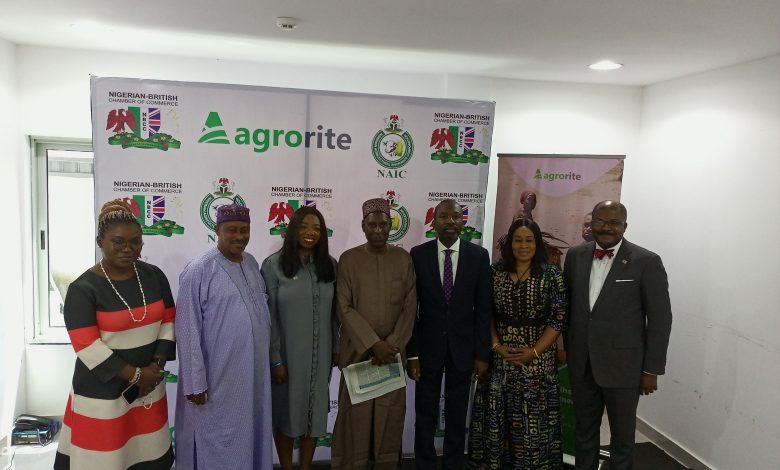
The Federal Ministry of Agriculture has been advised to create more awareness about digital agriculture or agricultural technology for the benefits of both farmers and the entire people of Nigeria.
This was the submission of speakers at an Agric and Export Workshop organized by the Nigerian-British Chamber of Commerce in Lagos, themed “Leveraging Technology and Digital Transformation in Agriculture”.
Pointing out that the impact of technology on smallholder farmers’ incomes is still poor, the Chairman of the Nigerian-British Chamber of Commerce, NBCC’s Agric and Export Group, Dr Sola Obabori emphasized that farmers’ knowledge and information must be constantly upgraded.
Dr Obabori explained that “through sensitization, go down to the grassroots to sensitize them, the Federal Ministry of Agriculture has a lot of role to play because it has the database of all these farmers, it can bring them to the classrooms and show them and go to the farms to demonstrate, hopefully, that will go down and percolate as time goes on”
A Business Manager at the International Institute of Tropical Agriculture, IITA, Ibadan, Mr Niels Van De Bosch, who shared numerous digital agricultural initiatives and startups leveraging technologies, which had resulted in improved farmer’s productivity and incomes, strengthening of food security and enhancement of the resilience of food systems, advised the Nigerian government to actively involve more youths in the agricultural sector.
“Oftentimes, elderly and smallholder farmers cannot simply adopt new technology because it’s a financial risk they need to take and because they are used to certain ways of doing things. In a country like Nigeria with so many highly educated youths, when you make use of them, you get access to energetic, proactive and resource-driven players who are willing to adopt and take a chance on new technologies” he said
Other speakers, including soilless farming expert, Mr Samson Ogbole and an IT expert, Mr Ebikekeme Ere pointed out that the use of technology in agriculture would help to check rural-urban migration and ultimately boost the sector’s contribution to the nation’s Gross Domestic Product, currently pegged at twenty-five percent.
Earlier in a keynote address, the Permanent Secretary, Federal Ministry of Agriculture, Dr Ernest Umakhihe, shared the National Agricultural Technology and Innovation Policy, NATIP, recently approved by the Federal Executive Council with stakeholders at the workshop.
The NATIP is a five year framework to guide the implementation of programmes and projects in the agricultural sector across all States in the country.
The Permanent Secretary who was represented by the Director of Planning and Policy Coordination in the Ministry, Mr Ibrahim Bello, explained that the NATIP from 2022-2027, would focus on the pillars of Synergy, alignment, access to mechanization, strenghtening value chains amongst others
“The underlying objective of Nigeria’s agricultural policy is productivity enhancement, private investment and institutional realignment for facilitating food security, enterprise promotion and economic empowerment in the country. It is to address the challenges of a growing population and declining revenues by promoting agribusiness, aiding economic livelihood, and attaining food security in the country” The P.S explained.
NBCC To Upscale Advocacy on Barriers In Exporting.
In the Meantime, the NBCC is set to boost advocacy on Barriers in Exporting.
During a news briefing at its headquarters in Lekki area of Lagos, the NBCC announces that based on lessons learnt from its May 2022 advocacy programme with the theme: “Eliminating Barriers in the Nigeria Export Process” the Chamber will be further enlightening stakeholders, both private and public on the business challenges in exporting Nigerian goods, especially non-oil exports.
It listed identified challenges to include:
➢ Multiple bureaucratic government regulatory agencies.
➢ Foreign exchange restrictions
➢ Inaccessibility to funding/financial institutions.
➢ Port infrastructural irregularities to mention but a few.
Attesting that International companies within the Nigerian market are not left out of this quagmire, the Chamber explains that they also face barriers including, fluctuating port charges, congestion moving in and out of the ports, bad roads and the continuous rising cost of diesel, delay in loading up vessels as well as high transport costs.
While appreciative of Government’s efforts at encouraging non-oil exports, the NBCC says more can be done in the Nigerian export space and requests that the Nigerian government do the following:
•Reduction of bureaucratic bottlenecks at the export agencies
•Digitalization of export services
•Sensitization of the exports community on due export processes
•Narrowing down the steps it takes for businesses to get information about market standards and policy
•Creation of uniform standard African policy to consider the standards set by international bodies for exports procedures and exports processes carried out locally.
“We want to use this medium to announce that we intend to further engage with the Nigerian Ports Authority, Shippers Council and other relevant authorities at the 2nd phase of the NBCC Advocacy Roundtable which will be coming up in August 2022. This event will address the issues of over-crowding, frequent delays and loss of cargo at the Port amongst others. We believe that the best policies use data-driven and evidence-based methods”
Discover more from Radio Nigeria Lagos
Subscribe to get the latest posts sent to your email.




